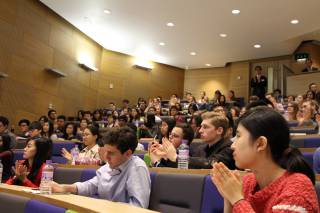ECON0055 > undergraduate module > 2020/21.
Module leader: Frank Witte.
Intended teaching term: Term 1.
Credits: 15 (FHEQ Level 6).
UCL Module Catalogue: economics-of-science-ECON0055
Aims
- To familiarize you with the way in which science & technology interact with the economy on different scales illustrated by empirical data.
- To introduce you to the notion of engineering production functions and their relation to ordinary production functions and how they are amended by technological progress.
- To introduce you to analyzing scientific progress and Science through knowledge engineering relations.
- To give you some hands on experience in modeling technological progress in growth models.
- To give you insight in science & technology funding and the distinct roles played by private investors and governments.
- To give you a proper grasp of the key international and national institutions facilitating and/or funding scientific research.
- To help you understand key aspects of scientific thought, the role of uncertainty in Science and the economic aspects of the way Science works.
- To give you an introductory knowledge of how to model networks and the flow of information or other assets through networks and apply this in the context of the economics of Science and Technology.
- To give you some insight in the current and past roles of science education for the economy as a whole as well as for the social mobility individual.
Suitable for
- 2nd & 3rd year Economics (L100, L101 and L102);
Prerequisites
ECON0010 or an equivalent 30 credits in year 1 (applied) Mathematics is required. ECON0002 or an equivalent 30 credits in Economics is also required. Some experience with Mathematica/Matlab such as acquired through ECON-skills lab (Year-1 and Year-2) or alternatively via ECON0114 Computational Methods for Economists is highly recommended but not required.
Assumed knowledge
The prerequisites cover a good familiarity with the key results from linear algebra and the calculus of several variables, in particular in optimization, and some elementary familiarity with ordinary, linear, differential equations and their solutions. A general familiarity with Economics at the level of the ECON0002 or an equivalent 30 credits in Economics, both the micro- as well as the macro-aspects, is also strictly required. An aptitude for computational and simulation work is highly recommended, as acquired through ECON0114 and/or the Economics Skills Lab.
Assessment
Methods of assessment are as detailed in the UCL Module Catalogue. Affiliate students joining the department for Term 1 only should contact economics.affiliates@ucl.ac.uk for further information.
 Close
Close


